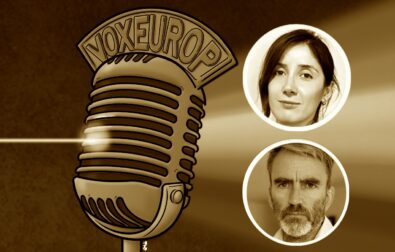On a street lined with cold buildings, institutions and factories, near a door, a traffic light changes from green to red. But it is not a traffic light that regulates traffic, rather it indicates the generosity of society. It is red when society has no money for culture and green when arts funding is available. A desk is lost amid the concrete blocks and the metal doors. Does it belong to the foreman or the chief engineer? Nay, it belongs to Rariţa Zbranca, the cultural manager of what's known as The Paintbrush Factory.
It consists of four floors of 500 square metres each – each with its galleries, its workshops and residential areas. At noon it is still quiet. These walls only come to life later in the day. And when there are exhibitions or shows, one can stay here late into the night. Teams relay each other to ensure a cultural presence. There are conferences by well-know Cluj figures, exhibitions of works by other European artists and projections of documentary films. It is more difficult to enter the workshops of the sculptors or painters – they inhabit their own world.
A common roof
The idea was born out of necessity. Faced with difficulties in opening an art gallery in the town, Romania's second major cultural centre, the artists of Cluj-Napoca decided to unite their efforts. From that standpoint, the new contemporary arts centre is proof that something good has resulted from the economic crisis. The price to rent a gallery rose to 10 euros per square metre in the centre of town in 2009. Cultural organisations were ready to give up due to lack of funds and sponsors.
Among these were Fondation AltArt and Rariţa Zbranca's Plan B Gallery, promoters of contemporary visual art. Then the artists of the Sabot Gallery discovered the former paintbrush factory, says Zbranca. There followed a few months of waffling, she adds, then "I created a federation called The Paintbrush Factory". Today, the project unites 46 entities, including nine collectives, five galleries and 32 artists.
This does not mean a new institution was born. The artists have found a common roof, but they all have their personal vision of art. Shows of theatre and dance alternate while other days there are painting or sculpture exhibitions, as well as film projections. "We ensure the promotion of these activities. Here we have a coherent relationship with the public," Zbranca adds. The result of this shared vision was visible between 2009 and 2011, a period during which the culture factory hosted 40 shows, 50 exhibitions, 30 workshops, 10 festivals and 15 conferences.
First sponsors
Behind the festive spirit resides the need for financial support. "Romanians do not have the sponsor mind-set," Zbranca explains. Sponsors are few and far between. An artist needs a space to create but must also pay the rent and buy materials. They don't live from their art and must accept side jobs. Daniela Cristina Gagiu, for example, works in interior design. For her, "the condition of the contemporary artist in Romania is to try to survive". In fact certain artists work night and day. They have a day job then at night they come to their workshop at the factory.
The first sponsors of Cluj's artists were foreigners. Norway, Liechtenstein and Iceland committed 75 000 euros to the project through the European Economic Area. It was they who later provided various pieces of equipment such as sound installations or dance mats. In the beginning, the local authorities did not help the factory but things have changed, says Zbranca.
The mayor of Cluj personally offered a grant of 30,000 lei [about 9,000 euros]. Good news began to flow with financing from the National Cultural Fund for a summer school project to be organised within the factory. "The Paintbrush Factory could become a creator of cultural policies different to those of the state with the advantage that such programmes could be tested in the factory itself," she argues. Clearly, ideas must first be "forged" at the factory. All the more so because Cluj, which is participating in the May Transeuropa Festival, aspires to the statute of 2020 European Capital of Culture.
Do you like our work?
Help multilingual European journalism to thrive, without ads or paywalls. Your one-off or regular support will keep our newsroom independent. Thank you!
















